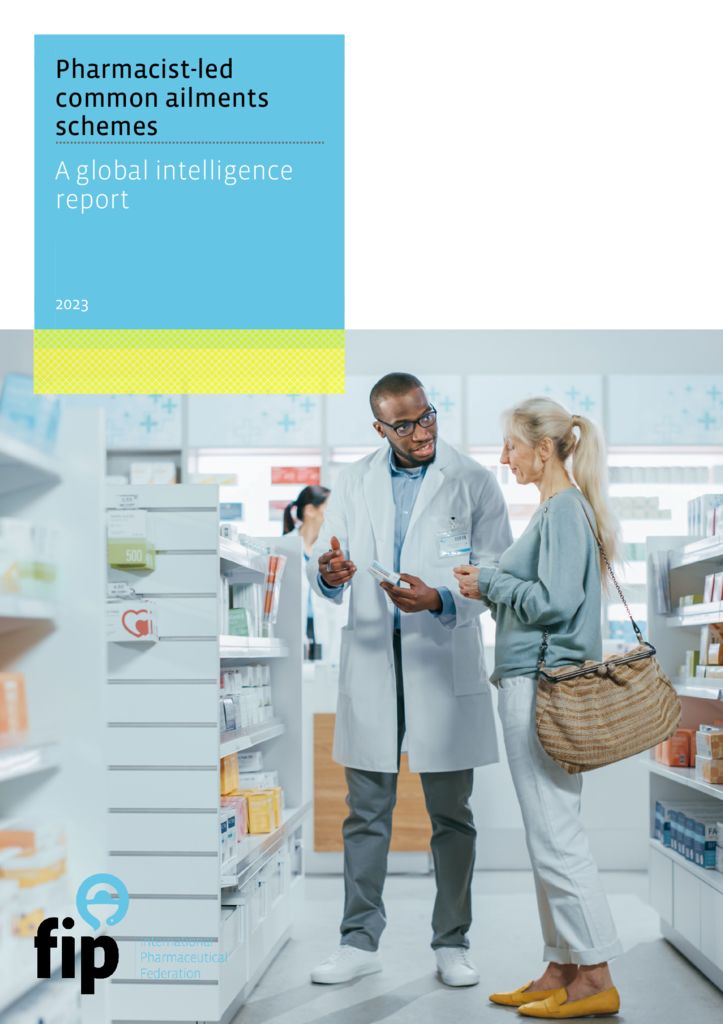The PDA joined FIP to ensure that pharmacists in the UK can contribute to, and benefit from, the global conversation about pharmacy. A recent example of that is a project from FIP to look at common ailments schemes around the world. As an active FIP member organisation, the PDA was able to contribute to the initiative and is now able to also share the report with members.
READ THE REPORT BELOW
In launching the report, Global President of FIP, Paul Sinclair AM said, “It is my pleasure to draw attention to emerging intelligence from FIP on pharmacist-led common ailments schemes, available to you in a new report published last week. The growing demand for care models, primarily attributed to ageing populations and the surge in chronic non-communicable diseases, stresses the importance of managing common ailments within primary healthcare settings, with pharmacists playing an essential role.
This report from FIP draws together data from 24 countries and presents case studies from nine countries. It gives examples of interventions that reduce pressure on general practitioners (GPs) and emergency departments, through more efficient and more sustainable health care models and schemes. The report highlights the diverse range of common ailments that pharmacists manage under these schemes, including prescribing authority and provision of medicinal treatments.
This work has found that common ailments schemes enhance convenience of access to care and patient quality of life, and reduce GP workloads while, economically, they present cost-effective alternatives. However, operational challenges persist, particularly in inconsistencies in service requirements and stakeholder engagement. The data indicate that while most countries supporting the implementation of common ailments schemes have professional standards in place, the specifics of these vary considerably. Different formularies, different geographical coverage and different remuneration pathways are examples of this variability. Public funding has emerged as the predominant source of remuneration for this type of service, and additional training has been mandated in two-thirds of the nations with these schemes. A notable difference across respondents also lies in the existence of collaborative arrangements with GPs.
The data also demonstrate the challenges faced by pharmacists wishing to implement common ailments schemes. Successful CAS implementation requires a multi-factorial approach, with important key areas for pharmacists’ engagement: public confidence-building, stakeholder engagement and a robust evidence-backed evaluation framework. Fostering a collaborative ethos between other members of the primary healthcare team and pharmacists remained crucial.
Community pharmacists around the world can and do provide early and meaningful interventions in a range of common conditions and symptoms on account of the ease of access of their pharmacies to patients. This report puts a spotlight on existing models and aims to encourage FIP member organisations to advocate leveraging pharmacies for this type of service. It is an invaluable reference to inform future development of common ailment schemes through exchanging evidence and experiences from individual countries.
In today’s dynamic healthcare landscape, FIP stands at the forefront of supporting both excellence and accessibility in primary health care. FIP takes pride in endorsing the progression of common ailment schemes worldwide as a contributor to improved access to health care and stronger healthcare systems.
We are committed to providing the necessary support to pharmacy professionals and their organisations to ensure they can offer pharmacy-backed self-care solutions effectively within their local communities. The FIP Development Goals, particularly DG18 (Access to medicines, devices and services) and DG21 (Sustainability in pharmacy) align with the principles of common ailment schemes. By integrating common ailment schemes with these wider goals, we are working to ensure that early interventions by pharmacists are not just an ideal, but rather an integral part of primary health care worldwide.
I believe this report is both a foundation and a catalyst — a foundation on which FIP and our member organisations can base initial strategies, and a catalyst to drive us to seek even more diverse and comprehensive insights in the future. By equipping pharmacists with the tools and knowledge they need, we strive to ensure that patients have access to timely, informed and personalised care.
I commend ‘Pharmacist-led common ailments schemes: A global intelligence report’ to all our members as a tool for advancing pharmacy worldwide.
Forward with pharmacy, Forward with FIP!”

Global President of FIP, Paul Sinclair AM
Not yet a PDA member?
If you have not yet joined the PDA, we encourage you to join today and ask your colleagues to do the same.
Membership is FREE to pharmacy students, trainee pharmacists, and for the first three months of being newly qualified.
Read about our key member benefits here.
